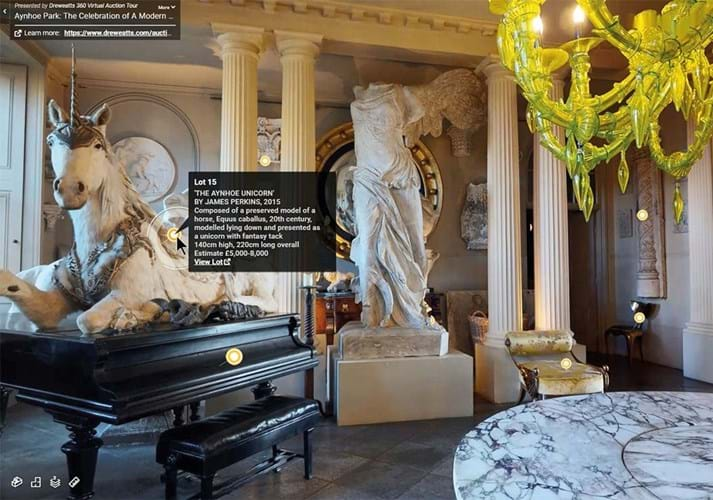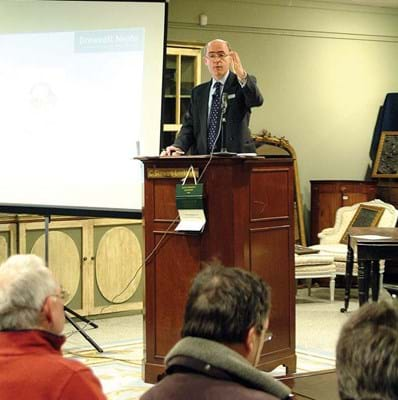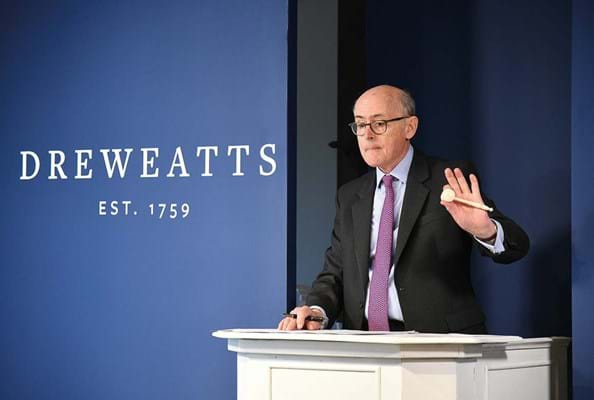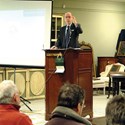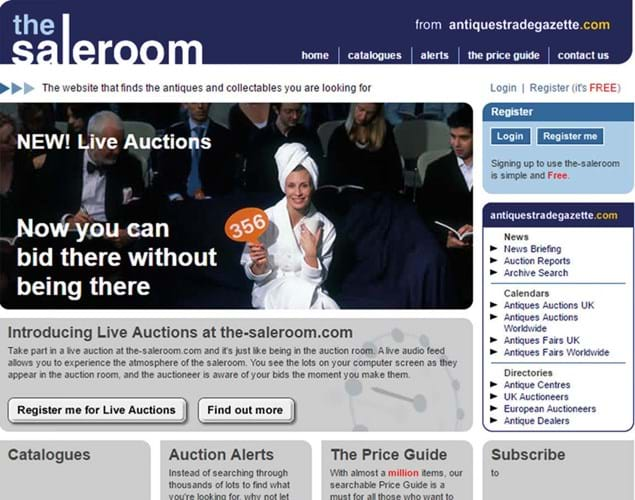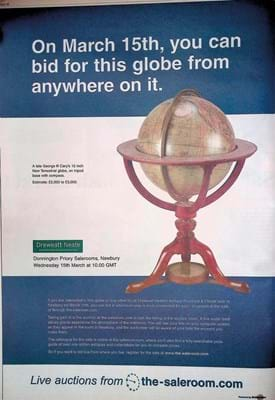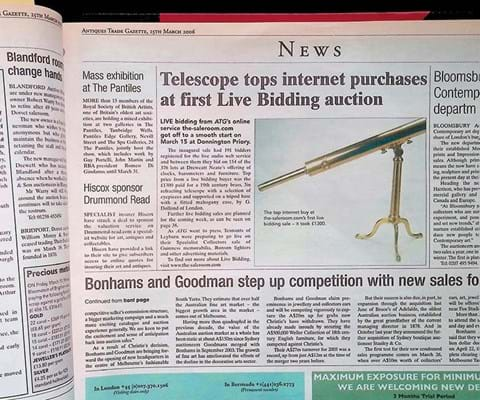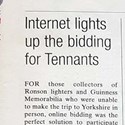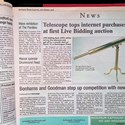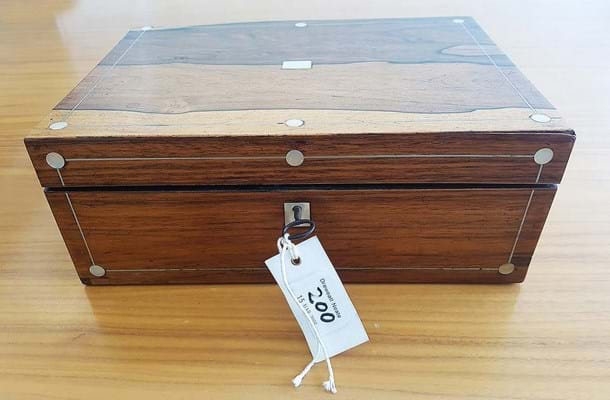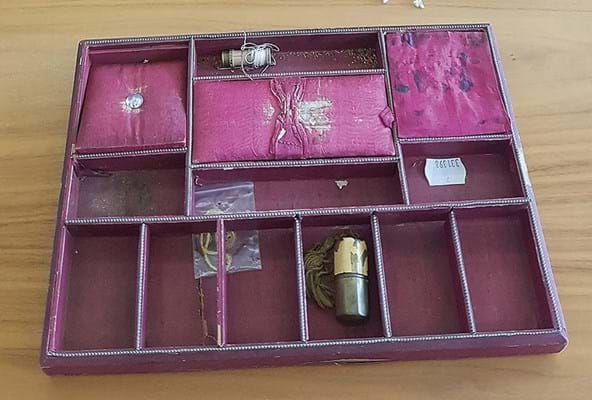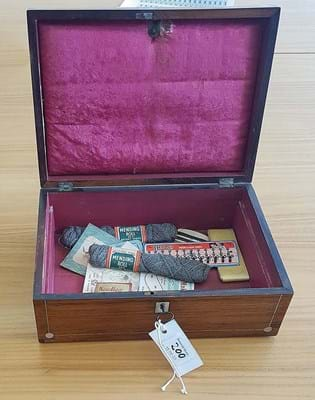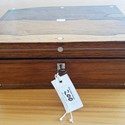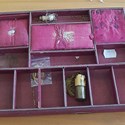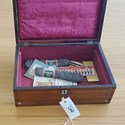A unicorn perched on top of an antique piano in an entrance hall greeted the 10,000 visitors who viewed the contents of a recent country house sale.
None of them had come in person, of course. Due to the current lockdown, they were all perusing the vast collection of eclectic items online thanks to a special virtual tour that enabled them to walk through every room in the house and see the lots in situ.
The tour was just one of a host of online initiatives undertaken by Dreweatts, the auction house running the Aynhoe Park country house sale in January this year, to ensure that as many people as possible would browse the catalogue and bid.
The two-day live online-only auction turned out to be a white-glove sale. With so many bids from 3000 online registrants and two rooms of staff taking phone bids, it proceeded more slowly than usual and the auctioneers on the rostrum took regular breaks, to be replaced by a colleague.
One of the auctioneers that day was Clive Stewart-Lockhart, a former Dreweatts managing director and now a self-employed art consultant, who had been drafted in to help out. “I was selling items for £100,000 that hadn’t been physically seen,” he said, noting how lockdown had made remote browsing and buying the norm.
While the success of the Aynhoe Park sale and its online promotional campaign represents another milestone for online auctioneering, 15 years ago this month at the same firm Stewart-Lockhart had taken another landmark sale: the first auction to use live bidding on thesaleroom.com.
It was this sale, held on March 15, 2006, that launched the modern era of internet bidding among UK regional auction houses and paved the way towards the world of online auctions as we know them today.
“I had actually done a live auction earlier on in the dial-up era,” Stewart-Lockhart recalls.
“It was never going to work but there was obviously a good idea there. It was clearly a way of engaging people who can’t turn up and for the vendor we would be providing a new bidder who might be spending more.”
Broadband boon
By 2006 faster connections were widely available and thesaleroom.com – which had been spun out of antiquestradegazette.com (and was, and still is, owned by ATG’s parent company) – was ready to host live sales in addition to the online auction catalogues it had been providing.
A number of auction houses were ready to try out the new service from mid-March with Dreweatt Neate, as it was known at the time, the first one. Its owner back then was Stephan Ludwig, now chief executive at Forum Auctions.
“What excited me most about ATG’s initiative was the certainty that its newspaper subscribers and growing community of digital registrants would deliver an immediate critical mass of new buyers to our auctions,” he recalls. “To this day, their delivery of fresh buyers is one of our most important buyer-acquisition tools.
“I had first invested in the auction industry in 2000 led, in part, by the conviction that e-commerce style execution and fulfilment would lead to a transformation in the industry’s revenue and costs. It remains a matter of pride that my firm produced the first auction held over thesaleroom.com.”
Being an early adopter of technology was nothing new to Dreweatt Neate. Its original telephone number was Newbury 1 – indicating the firm was the first in its area to get connected (the original handset was recently rediscovered in a cupboard at the firm’s premises). Later, when its hometown had become the headquarters of Vodafone, the auction house’s staff were all equipped with mobile phones well before the device had become mainstream elsewhere.
Ahead of its first live online auction, however, one communication challenge remained. “Our primary concern at the time was the practical reality of both multi-second latency and the inherent instability of ADSL internet connectivity,” says Ludwig. “Happily a dedicated ‘leased line’ resolved this concern, albeit the monthly BT bill to connect Donnington Priory to the Reading exchange probably outweighed the incremental income from additional bidders in the early years!”
While this was being arranged, ATG was busy promoting the auction with an advertising campaign that ran not only in Antiques Trade Gazette but across a range of other publications in the UK, the US and Australia. One advert featured a picture of a lot from the sale with the strapline ‘On March 15 you can bid on this globe from anywhere on it’.
Another showed a room of bidders in corporate attire except for a lady in the front row wearing a white dressing gown with a laptop in front of her. ‘Now you can bid there without being there,’ it proclaimed. Quite how ATG had persuaded Sotheby’s Olympia to allow it to stage this shot in its premises may never be known.
All change
On the day of the Antique Furniture & Clocks sale Stewart-Lockhart shared proceedings with fellow auctioneer Elaine Binning (a 25-year veteran of Dreweatts, she now works as a consultant at Woolley & Wallis).
“There was a real hush in the room,” says Binning. “People were aware of what was going on as that first lot was sold. With hindsight it was a real turning point. We were there experiencing a little glimpse into how it might be in the future.”
There was no live video stream yet for bidders, just live audio for them to hear the action going on in the room. Binning’s colleagues, sat at a table near the rostrum, monitored the online activity and raised their hand to indicate a new internet bid had been received.
And it was not just the way the audience could bid that had changed. “We soon grasped that the rhythm and flow of the auction had started to change forever,” says Binning. “Up to that point you were in control of the speed but now there was a slight detachment of the bidder that we’d never experienced before.”
With no opportunity to read body language and no way to make eye contact, auctioneers had to adapt quickly. They were grateful for a new ‘hovering’ feature that was soon introduced to enable them to see how many bidders had their cursor over the bid button and when live video was added a couple of years later they also had to start performing to the camera for the bidders at home as well as for the bidders in the room.
A total of 191 online bidders registered for the Dreweatt Neate sale and bid on 154 of the 376 lots. In the end, a more modest 13 lots were sold to online buyers for a total of £5,510 hammer, representing 1.6% of the sale by value. The top lot sold online was a nineteenth century telescope for £1300. One of the other lots was an early Victorian rosewood work box sold for £150. The buyer was ATG’s Simon Berti bidding from the firm’s London office, which is where the box can be found today – with its original lot label still attached.
Sales take off
The second live auction, held at Tennants on March 18, fared even better with around 10% sold through the internet, and at the two-day sale at Bamfords on March 21-22 an impressive 129 lots sold online (9% of the total) for a hammer value of £35,069.
Other live auctions quickly followed at firms including Wallis & Wallis, Byrne’s, Sworders, WH Lane, Paul Beighton, Peter Wilson and Neales.
Across March and April Dreweatt Neate held a series of sales with live bidding at its venues in Donnington Priory, Marlborough, Bristol and Godalming. It became clear to Ludwig that online buyers were comfortable vying for a wide range of different lots. “In those early months I recall being most surprised by the extent to which ‘brown furniture’ and heavy Victorian framed art was bought online,” he says.
“Having initially dwelt on the benefits of online bidding for items that could be easily despatched in a jiffy bag, we hadn’t really considered the impact on bidders of bulkier lots being able to use their time more effectively.
“While there was initially no material increase in bidding for items ‘unseen’, the freedom to participate in auctions remotely without the inconvenience of negotiating telephone bids was a tremendous boon to both privates and the trade.
“Within 12 months of our implementation of live online bidding we were seeing 20% of lots selling over the internet with this rising to around 40% by 2010.”
Modern-day bidding
Fast forward to 2021 where the Dreweatts of today - now owned by art consultancy Gurr Johns – sold 79% of lots to online buyers at the Aynhoe Park auction.
The auction house had recently chosen thesaleroom.com’s white label service to power the Dreweatts Live online bidding on its own website and had decided to run timed auctions with thesaleroom.com as well.
“I like to keep things simple,” says managing director Jonathan Pratt. “It allows us to synchronise all the things we are doing for clients and ensure they are all marketed in the same way.”
The two-day live auction was followed by a timed auction on the third day of more than 200 lots which took the sale total to a premium-inclusive £4.1 million. As well as the 360˚ virtual tour, the firm also provided remote viewing via video calls and held an online event about creating a country house in the 21st century with guest speakers such as designer Thomas Heatherwick. These initiatives were backed up by preview videos posted on YouTube and a 396-page interactive catalogue to accompany the more traditional printed version.
The extensive marketing campaign and innovative digital promotions underline the effort required to make such a major sale successful today. It clearly paid off with online biddders registering from more than 40 different countries.
Joe Robinson, head of house sales and collections at Dreweatts and the specialist in charge of the Aynhoe Park sale, says: “House sales are sales which have traditionally captured a great deal of interest and ignite a great deal of energy around them – it is how you harness this energy as well as adapt with the changing face of the art market which determines the success.
“We are constantly challenging and re-imagining the way we present our sales, but Covid-19 has forced us to do this in double-quick time. From creating virtual tours and offering remote viewings via Facetime, to multi-room telephone bidding and multiple online bidding platforms, sales have been made more accessible not just to UK bidders but also to a wider international audience.
“People who would usually be unable to view an exhibition in person are now able to explore the galleries, assess colour and consider scale. It allows bidders to feel a part of the event and bid confidently.
“All helped to capture the feel and flare of an event sale while being conducted behind closed doors and predominantly through digital platforms. A passionate and imaginative team and energetic auctioneers also help.”
The road ahead
What does the next 15 years hold for online bidding in art and antiques?
The current pandemic has accelerated trends already under way: buyers are increasingly willing to browse and bid without the need for viewings, particularly when lots are well-photographed and accompanied by condition reports; timed auctions are on the rise as are the hammer values of the items sold in them; auctioneers are eager to spend less time arranging and presenting lots within their premises and more time gaining consignments and creatively marketing their sales.
Crucially, fulfilment and delivery services will become increasingly important because more remote buyers mean fewer collections in person.
“I expect the days of a full saleroom are a thing of the past,” concludes Stewart-Lockhart.
“Why drive hundreds of miles to wait around for two lots? Online bidding has been a huge bonus. Those who adopted it have thrived with it.”


